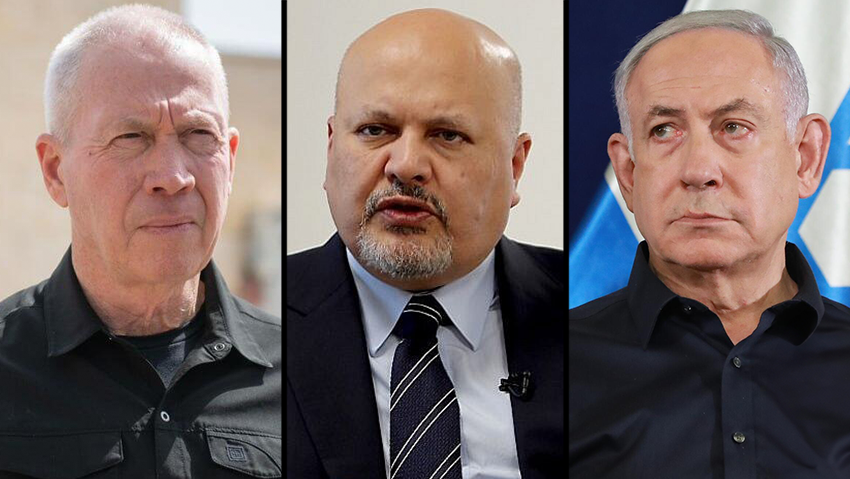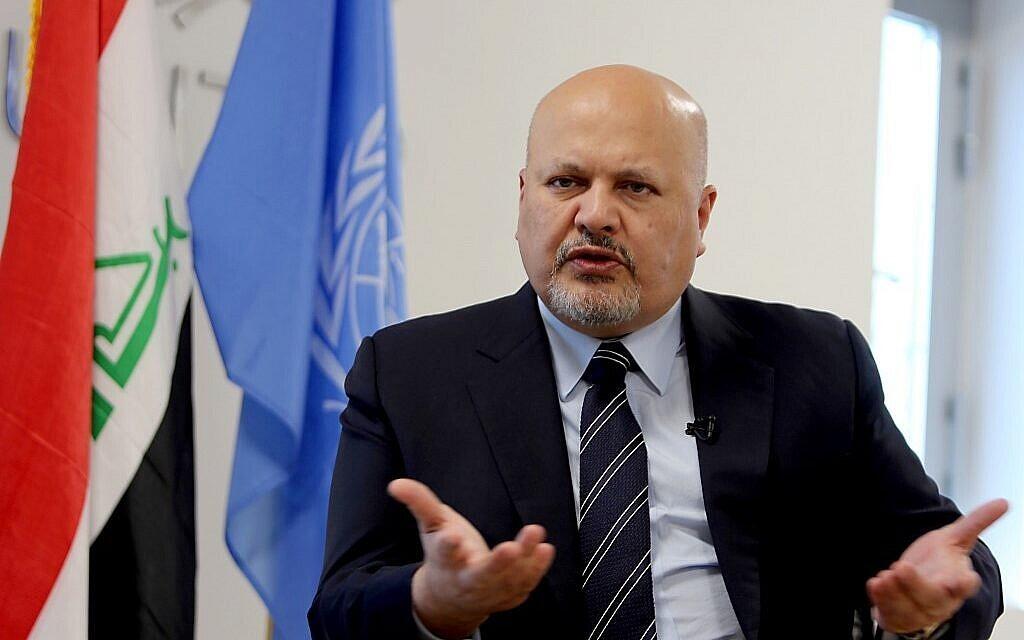Getting your Trinity Audio player ready...
Karim Khan announces request for arrest warrants against Netanyahu, Gallant and Hamas leaders
(Video: ICC )
The International Criminal Court (ICC) is close to deciding whether to issue arrest warrants for Prime Minister Benjamin Netanyahu and Defense Minister Yoav Gallant, following a request by Chief Prosecutor Karim Khan. Speculation suggests the decision could coincide with the anniversary of the October 7 massacre, though a delay remains possible.
Israel has filed two objections, hoping to halt the process. One challenges the ICC’s jurisdiction over the case, while the other accuses the prosecutor of violating court protocol by not allowing Israel to investigate the allegations independently. While these objections have briefly delayed the court's decision, there is little optimism in Jerusalem that they will succeed.
2 View gallery


Defense Minister Yoav Gallant, ICC Chief Prosecutor Karim Khan and Minister Benjamin Netanyahu
(Photo: Dana Kopel, AFP, Shahar Yurman)
Should the ICC move forward with arrest warrants, Israel is expected to appeal. However, the appeal process could take months, and an appeal does not guarantee that the ruling will be overturned.
If warrants are issued, all 123 ICC member states would be obligated to arrest Netanyahu and Gallant if they enter their territories and extradite them to The Hague. The question of immunity for sitting officials remains unresolved, with past cases, such as deposed Sudanese despot Omar al-Bashir, illustrating the complexities of enforcing such warrants.
The implications extend beyond the individuals targeted. The ICC decision could strain Israel’s diplomatic relations, especially with key allies like France, Germany and the UK, which may advise Netanyahu and Gallant to avoid visits to prevent legal entanglements. Non-member states could also choose to arrest and extradite them, increasing the international pressure.
The issuance of warrants would imply that Netanyahu and Gallant are accused of war crimes and crimes against humanity, which could damage Israel’s already fragile international standing. Countries such as Canada might even be pressured to sever ties with Israel’s leadership. Furthermore, it could impact Israel’s military operations, raising concerns about international sanctions and arms embargoes.
Israel’s options to prevent the warrants are limited. One potential avenue is the formation of a state commission of inquiry into the events of October 7. However, Netanyahu has rejected the attorney general’s recommendation to establish such a commission, leaving the country without a mechanism to assert it is investigating the matter internally.
If the warrants are issued, they could haunt Netanyahu and Gallant for life, limiting their international travel and exposing them to arrest, even after their terms in office end. While Netanyahu could still travel to non-ICC member states such as the U.S. or Russia, ICC warrants would severely curtail his diplomatic reach.
The warrants would likely end any dialogue between Israel and the ICC. Netanyahu has accused Prosecutor Khan of political bias, and the Israeli government claims the ICC’s actions are politically motivated. Israel has made it clear that it will not negotiate or extradite its leaders to The Hague.
One factor that could influence the court’s decision is the broader regional context. Significant developments, such as the assassination of Hezbollah leader Hassan Nasrallah or Netanyahu’s role in brokering normalization with Saudi Arabia, could weigh on the court’s deliberations. A source familiar with ICC operations suggested that arrest warrants would make Netanyahu a "persona non grata" in many Western nations, potentially forcing leaders like French President Emmanuel Macron to distance themselves.
Critics argue that Israel’s handling of the ICC has been flawed. Though it does not formally recognize the court, Israel has engaged with it by submitting legal documents. Observers have noted that Israel missed an opportunity to negotiate a voluntary appearance for Netanyahu and Gallant, which could have allowed them to continue serving in their roles.
The situation recalls the 2014 case involving Kenyan President Uhuru Kenyatta, who faced charges at the ICC. Kenyatta temporarily relinquished his powers to attend a hearing, denying the charges and maintaining his role. His lawyer at the time, Karim Khan, is now the ICC’s chief prosecutor. The trial continued in Kenyatta’s absence, allowing him and then-Vice President William Ruto to retain their leadership positions.
Get the Ynetnews app on your smartphone:







